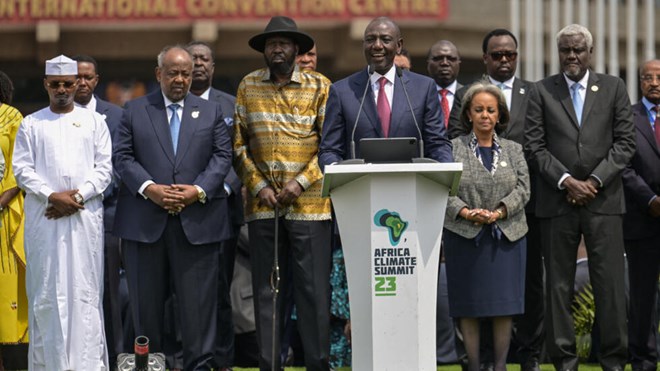African leaders call for new global taxes to fund climate change action

Source: Reuters, By Duncan Miriri
Thursday September 7, 2023

African leaders on Wednesday proposed new global taxes and reforms to international financial institutions to help fund climate change action in a declaration that will form the basis of their negotiating position at November’s COP28 summit.
The Nairobi Declaration capped the three-day Africa Climate Summit in Kenya, which was dominated by discussions of how to mobilise financing to adapt to increasingly extreme weather, conserve natural resources and develop renewable energy.
Despite suffering from some of the worst impacts of climate change, Africa only receives about 12% of the nearly $300 billion in annual financing it needs to cope, according to researchers.
While organisers emphasised market-based solutions such as carbon credits in the lead-up to the summit, the final declaration was heaviest on demands that major polluters and global financial institutions commit more resources to help poorer nations and make it easier for them to borrow at affordable rates.
It urged world leaders “to rally behind the proposal for a global carbon taxation regime including a carbon tax on fossil fuel trade, maritime transport and aviation, that may also be augmented by a global financial transaction tax”.
It said implementing such measures at a global level would ensure large-scale financing for climate-related investments and insulate the issue of tax raises from geopolitical and domestic political pressures.
About two dozen countries impose taxes on carbon, according to the International Monetary Fund (IMF), but the idea of a global carbon tax regime has never gained much traction.
On Tuesday, Kenyan President William Ruto cited proposals in the European Union for a financial transaction tax (FTT) as a potential model.
After the European Commission proposed an FTT in 2011, some conservation groups said the money should finance environmental priorities.
The commission’s proposal never won the unanimous approval required from the European Council to become law, although some member states have enacted their own FTTs.
INTERNATIONAL FINANCIAL SYSTEM
African countries will take the proposals in the Nairobi Declaration to a U.N. climate conference later this month and the COP28 summit which begins in the United Arab Emirates in late November.
Joab Bwire Okanda, a senior advisor at the Christian Aid charity, said the call for a global carbon tax was welcome but that “to make polluters really pay, false solutions like carbon credits that allow polluters a free ride without taking meaningful action need to be consigned to the dustbin”.
Some activists say the credits, which allow polluters to offset emissions by funding green activities, are a pretext for big polluters to keep emitting carbon dioxide.
Ruto said governments, development banks, private investors and philanthropists committed a combined $23 billion in all to green projects over the three days, including hundreds of millions to a major carbon markets initiative.
But African leaders acknowledged that those kinds of investments only scratch the surface of the continent’s financial needs and said more systemic changes were needed.
For example, African countries say they are forced to pay borrowing costs that are five to eight times higher than wealthy countries, leading to recurrent debt crises and preventing them from spending more to respond to climate change.
The declaration called on multilateral development banks to increase concessional lending to poorer countries and for the “better deployment” of the IMF’s special drawing rights mechanism.
Other proposals included measures to help indebted countries avoid default such as instruments that can grant 10-year grace periods and extend sovereign debt tenor.
Some analysts said the summit had not focused enough on how to help Africans adapt to extreme weather.
“Many communities bearing the brunt of increasing floods and droughts, while also at risk of conflict, are disappointed that there wasn’t more emphasis on ensuring that green investments trickle down to them,” said Nazanine Moshiri, a senior analyst at the International Crisis Group think-tank.
Additional reporting by Susanna Twidale in London; Writing by Aaron Ross; Editing by Alison Williams and Emelia Sithole-Matarise
